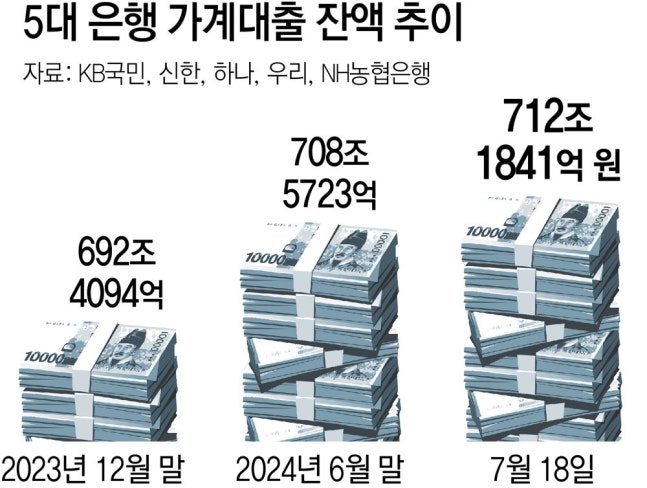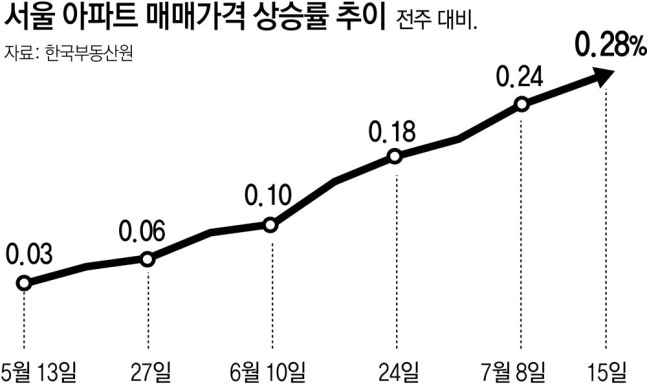Increase in housing transactions in the Seoul metropolitan area amid interest rate cuts
Household loans increase by 3.6 trillion won in just this month
Authorities, which had postponed regulations, are now conducting loan inspections
Criticism that they are “fixing the barn after losing the cow” ,

,
, ‘In just this month, household loans from the five major banks (KB Kookmin, Shinhan, Hana, Woori, NH Nonghyup) have increased by over 3.6 trillion won. The fluctuation in real estate prices in the Seoul metropolitan area, along with lower loan interest rates, is believed to have led to an increase in the stress debt service ratio (DSR) 2nd phase until September, as the introduction of the regulation has been unexpectedly postponed to September, creating a situation where apartment end-users are rushing to take out loans. The financial authorities have started inspecting banks to manage household loans, but criticism that they are “fixing the barn after losing the cow” continues.’,
,
, ● Housing loans increase by 3.8 trillion won in just this month,
,

, ‘According to the financial sector on the 21st, the outstanding household loans of the five major banks as of the 18th reached 712 trillion 184.1 billion won, an increase of 3 trillion 611.8 billion won compared to the end of last month. While unsecured loans slightly decreased, mortgage loans increased by 3 trillion 799.1 billion won from the previous month, boosting the overall household loan growth.’,
,
, ‘As demand for loans, centered around mortgage loans, continues to flow steadily, the outstanding household loans of the five major banks have increased by a total of 16 trillion 162.9 billion won from the beginning of the year to the end of last month. This is 29.3% higher than the target of this year’s household loan increase received from the office of Rep. Cheon Jun-ho, a member of the ruling Democratic Party’s National Assembly Standing Committee (12.5 trillion won). It has exceeded the annual loan growth target for six months at the major banks.’,
,
, ‘The financial sector points to the increase in demand for housing transactions in the Seoul metropolitan area and the decrease in loan interest rates as the primary reasons for the surge in household loans. Cho Soo-yeon, a senior specialist at KB Kookmin Bank, explained, “The recent increase in housing transactions, along with the outlook of interest rate cuts by the end of the year, is playing a significant role in the rebound of housing prices in the Seoul metropolitan area.” Despite the surprise increase in household loans, financial authorities have been pressuring banks to raise interest rates, but it is not effective at the front line of loan counters. With market interest rates plummeting due to expectations for interest rate cuts in the second half of the year (July-December), banks have limited room to increase lending rates, even if they raise the margin rate. The lower end of the fixed interest rates for the major banks’ mortgage loans are already in the late 2% range.’,
,
, ‘The delayed implementation of the stress DSR phase 2 from July to September has also been identified as a factor stimulating the demand from actual end-users. Kim Sang-bong, a professor of economics at Hansung University, expressed concern, stating, “By unexpectedly postponing the introduction of the stress DSR phase, the authorities have incited confusion in the market,” and added, “Unless fundamental measures, such as including lease loans in the DSR, are introduced, it will be difficult for the buying demand of apartment end-users to weaken in the current market situation.”‘,
,
, ● Emerging demand for speculative buying increases household debt,
,
, ‘The increasing demand for “speculative buying” to purchase core area apartments by taking out bank loans as the Seoul metropolitan area real estate market heats up is also fueling the increase in household debt. ‘,
,
, ‘Yoon Mo, a 33-year-old office worker preparing for marriage in February next year, recently purchased an apartment in Mapo-gu, Seoul, for about 900 million won. With lower loan interest rates reducing the repayment burden and the lease prices rising for over a year, he judged it was the right time to purchase. He said, “There is a talk that new supplies of apartments in Seoul will be scarce for the time being, and with lease prices also rising, I felt uneasy, so my fiancée and I agreed to take out as many loans as possible to buy a house and ended up grabbing a quick deal.”‘,
,

, ‘Meanwhile, housing prices in the Seoul metropolitan area continue to rise. According to the Korea Real Estate Information Center, apartment prices in Seoul have risen for 17 consecutive weeks this month, and apartment prices in the metropolitan area have risen for 9 consecutive weeks. In particular, the weekly transaction price of apartments in Seoul increased by 0.28% compared to the previous week, marking the largest increase in 5 years and 10 months. According to Zigbang, as demand for “high-quality apartments” mainly in Seoul and the metropolitan area grows, the proportion of transactions at record prices among Seoul apartment transactions in the previous month was 9.3%, up 1.0 percentage points from January this year. Among the 5,807 Seoul apartment transactions last month (as of the 18th of this month), the ratio of “ascending transactions” where prices rose by more than 1% compared to the previous transaction was 49.6% (2,882 transactions), showing an 11 percentage point increase from January.’,
,
,

